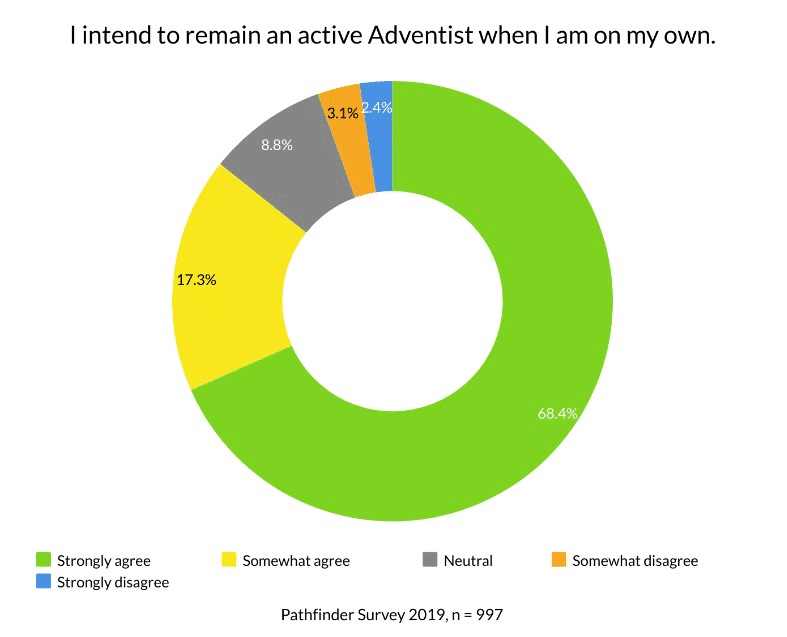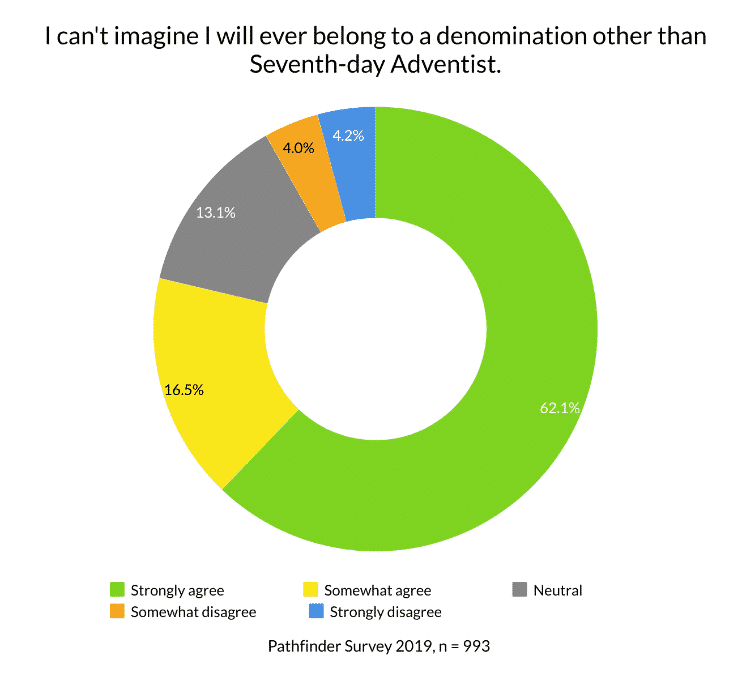In several of these previous blogs The Leaky Bucket: Examining Church Dropouts, First Love: Dropouts’ Beginning Experiences in the Seventh-day Adventist Church, Searching For the Lost, we have examined various aspects of church dropouts. However, there are trends when it comes to specific factors that influence young people as they look forward to a lifetime commitment to the Church.
A study was conducted by the Institute of Church Ministry, in conjunction with the Center for Youth Evangelism, at the Chosen International Pathfinder Camporee (CIC) held in Oshkosh, Wisconsin, in 2019, which included 1,024 participants, with a total of 993 surveys completed. One of the survey questions asked young people to respond to the statement, “I intend to remain an active Adventist when I am on my own.” A majority (85%) of respondents somewhat agreed or strongly agreed that they intend to remain in the Adventist Church as adults.

Similarly, young people were asked to respond to the statement, “I can’t imagine I will ever belong to a denomination other than Seventh-day Adventist.” Nearly four out of five (79%) young people somewhat agreed or strongly agreed with this statement.

While these numbers appear to be encouraging, Roger Dudley’s 2000 study “Why Teenagers are Leaving the Church” identified eight factors that can help predict which types of teenagers are more likely to remain in the church when they are on their own.((It should be noted that when NAD data was extracted from the CIC survey, there is a strong correlation between young people who do not intend to stay in the church and those who do not have the eight factors present in their lives.))
1. Factor: Mother attends church regularly
Over three fourths (77%) of young people who participated in the CIC survey reported that their mothers attend church nearly every week. Only 6% of survey participants reported that their mothers never attend.
2. Factor: Seventh-day Adventist school attendance
Nearly a third (31%) of the CIC respondents reported that they attended an Adventist school, while another 6% attended a Christian school. However, 45% of respondents shared that they attended public school.
3. Factor: Father attends church regularly
Over half (56%) of young people reported that their fathers attend church almost every week. Interestingly, 16% of respondents reported that their fathers never go to church.
4. Factor: Participate regularly in family worship
A little over a third (38%) of the respondents shared that they engaged in family worship almost every day, while 23% did so once or twice a week. Almost one in ten (9%) reported never to participate in family worship.
5. Factor: Consider Adventist standards and rules reasonable
When asked how they feel about Adventist standards and rules, 30% of the CIC respondents strongly agreed that these standards and rules are reasonable, while a greater number (33%) somewhat agreed. Thirteen percent disagreed to one extent or another.
6. Factor: Close to their pastor
Nearly one in five (17%) CIC young people reported that they were very close to their pastor. However, greater numbers reported being somewhat close (25%) or moderately close (31%).
7. Factor: Friendships with Christian peers
Over a third (34%) of CIC respondents shared that they were very close to Adventist peers, and another 32% reported that they were somewhat close. Additionally, one fourth (25%) of young people stated that they were very close to Christian peers, while a greater number (35%) were somewhat close to Christian peers.
8. Factor: Mentor in the church
Only 15% of young people who participated in the CIC survey strongly agreed that their church had sufficient programs to meet their spiritual needs; over a third (38%) somewhat agreed. However, 28% disagreed to one extent or another that their church met their spiritual needs.
Dudley’s study also showed that the marital status of a young person’s biological parents can impact his or her retention in the Adventist Church. Nearly two thirds (63%) of the CIC survey respondents reported that they live at home with both biological parents. Another 9% reported that their parents are separated, while 12% come from broken homes (parents divorced).

Interestingly, Dudley also identified that a young person’s intention to remain in the church also impacts his or her retention within the church. Thus, it is encouraging that 85% of the CIC participants intended to remain Adventists when they are on their own.
In light of these eight factors, several key findings emerged from this study that should serve as areas of action and recommendations from the local church level up.
- Acceptance in the local church makes a difference in young people’s commitment to remain a Seventh-day Adventist.
- The local church’s help to enhance spiritual growth makes a difference.
- When the church meets the spiritual need of youth (Sabbath school, literature, church services, etc.), these young people are more likely to stay in the church.
- A positive perception regarding the standards and rules of the church makes a difference in young people’s intention to stay in the church.
Consider the young people in your congregation. What can your church body do to prevent them from becoming dropouts? What can you, personally, do to keep your young people connected to Jesus? Given parents’ impact on young people’s retention, how should the church educate parents on their role in this matter? How can local churches be more intentional about encouraging members to extend grace to young people? Not only to those who come from broken homes or who attend public schools but all. What pastors can do to become closer to young people? How can these young people be involved in the church service or other church projects? They are not only the leaders for tomorrow but for today.
In 1 Timothy 4:12 NLT it says: “Don’t let anyone think less of you because you are young. Be an example to all believers in what you say, in the way you live, in your love, your faith, and your purity.”
Let us take this bible verse to heart and give these young people the opportunity to become an active part of the church body.
Watch for our next research blog on the same study.
Creado en colaboración con el Instituto del Ministerio de la Iglesia (Institute of Church Ministry).
Published by ASTR

